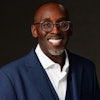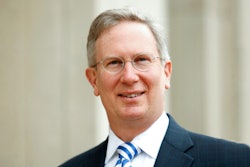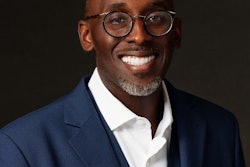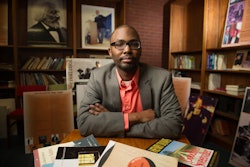 Dr. DeQuan Smith-Murry
Dr. DeQuan Smith-Murry
That job falls to Dr. DeQuan Smith-Murry, assistant dean of student affairs at Morehouse’s medical school. Colleagues praise Smith-Murry as an innovative and transformative medical education leader with a proven track record of improving systems and placing a laser-sharp focus on student wellbeing.
“Dr. DeQuan Smith-Murry is a strategic innovator and visionary leader in medical education who consistently identifies and addresses operational, administrative, and educational barriers that impede student success,” says Aise Cannon, Access Manager at Morehouse School of Medicine’s Office of Inclusive Learning and Accessibility Services, or OILAS.
“His work exemplifies a commitment to transformative solutions that create sustainable pathways for learners to thrive academically, professionally, and personally,” Cannon says.
“What sets him apart is his unwavering commitment to creating culturally affirming and intentionally collaborative workspaces,” says David V. Jones, director of Career Services & Industry Partnerships at the Morehouse School of Medicine. “He doesn’t treat diversity as an add-on but instead builds it into the foundation of the work that we do. He’s preparing a group of professionals who not only know the function of their units, but he is also ensuring that we critically think about how our respective areas intersect in support of student success”.
Jones says Smith-Murry is always looking at the bigger picture.
“Grounded in systems thinking, Dr. Smith-Murry views medical education as a dynamic ecosystem,” Jones says. “Rather than treating academic challenges in isolation, he integrates data analysis, mentorship pipelines, and leadership development into comprehensive strategies that strengthen institutional infrastructure and learner outcomes,” Jones says, adding that his “holistic perspective allows him to identify patterns, anticipate and comprehensively address barriers, and design scalable solutions that promote sustainability across departments and campuses.”
Smith-Murry is “deeply committed to student wellness and holistic development,” says Cannon.
An impressive track record
Concrete examples of Smith-Murry’s work in fostering student wellbeing and success are not hard to find. Colleagues also credit Smith-Murry with being a champion for advancing equitable access for students with disabilities.
For example, Dr. Erica Sutton, senior associate dean for undergraduate medical education at Morehouse School of Medicine, speaks of how Murry-Smith led the creation of personalized “psycho educational assessments” for students that she says helped them access the learning tools they uniquely needed for success.
Cannon says the evaluations were formed in partnership with a licensed psychological services provider to offer the evaluations for students referred to the Office of Accessibility.
“This ensures that students who request accommodations and would otherwise not have the access due to financial constraints, the opportunity to receive the necessary support to succeed both academically and in clinical training environments,” Cannon says. Cannon also points to Smith-Murry’s role in leading the 2022 launch of an institutional wellness strategy by leading the implementation of an Interactive Core Wellness application.
“His leadership resulted in over a 50% increase in campus wellness participation,” Cannon says. “He further advanced this mission by organizing the institution’s inaugural Wellness Fair the following year, solidifying his role as a champion for student balance and well-being.”
Smith-Murry places a high value on professional development.
One of his most notable accomplishments includes securing a $150,000 Johnson & Johnson grant to enhance Career Services at Morehouse School of Medicine. Through this initiative, Smith-Murry developed a 12-week professional development seminar in collaboration with leaders from the health, medical, and scientific industries.
“This program equipped 20 students with essential skills and tools to successfully transition into the workforce and excel in their chosen fields,” Cannon says.
Colleagues also credit Smith-Murry with taking a collaborative approach to improving student success that incorporates perspectives from students and faculty alike. For instance, as part of Morehouse’s Brown Bag Lunch series earlier this year, Smith-Murry delivered a presentation titled “Connecting Faculty & Student Support Services for Holistic Success.” The talk brought together student advocates, faculty, and support service partners to develop innovative strategies aimed at empowering learners and nurturing their success, Jones says.
Preparing a workforce to address disparities
Smith-Murry says his work at the Morehouse School of Medicine is about much more than helping students succeed. It’s about preparing a highly skilled healthcare workforce that can effectively serve a U.S. population with stubbornly persistent health care disparities.
“What’s at stake is the entire health and scientific workforce,” Smith-Murry tells Diverse. “People of color are disproportionately marginalized in the space of having Black providers.”
The need, he says, for these providers to be in rural or underrepresented places is increasingly important – more now than ever before.
“Understanding just some of the nuance around academic medicine and what that means for health care today, I don’t think there’s a time that’s more critical than what we’re seeing right now,” Smith-Murry says.
Indeed – as a 2023 article in the Western Journal of Emergency Medicine points out – “an overwhelming body of evidence points to an inextricable link between race and health disparities in the United States.”
A 2024 KFF study found that Black, Hispanic and American Indian or Alaska Native people “fare worse than white people across the majority of examined measures of health and health care and social determinants of health.”
The Morehouse School of Medicine enjoys a respectable standing among its peers for the number of graduates who work in professional shortage areas or rural areas. Despite the medical school’s success, Smith-Murry believes the school can play a bigger role in eliminating growing disparities. A major part of that will be helping students develop the skills and competencies that health care organizations value.
To that end, Smith-Murry founded Morehouse School of Medicine’s inaugural Emerging Student Leadership Academy. The two-day event was designed to equip students with the skills and mindsets required for success in academic, clinical, and professional environments. It also supports personal growth and professional identity development.
Smith-Murry says the idea for the academy grew out of conversations he had with various companies about the kinds of skills and development students need to be ready for work.
To assess the academy’s impact, Smith-Murry says he plans to stay in touch with the students as they matriculate through medical school.
“I will be working with each of the students, following their journey as they continue to forge a path forward within these health care workforce organizations,” he adds.
Much of Smith-Murry’s work involves helping students through various crises that arise on their educational journeys. To that end, Smith-Murry helped launch the Launch of the Office of Student Success. He describes it as a centralized “one-stop shop” for comprehensive wraparound services.
Among other things, the Office of Student Success offers academic coaching, wellness resources, and career readiness programming. Smith-Murry says the office is one way that colleges can avoid sending students to different offices for help that they may ultimately never get.
Often, he says, the most pressing issues for students involve the high cost of rent, access to health care and financial aid.
“It’s really about removing barriers, making sure there’s an individual plan for how to customize solutions to support students,” Smith-Murry says. “There’s no one-size-fits-all approach. It’s really each student is different, and they come with differences as to where they are.”
Expanding nationwide
One of Smith-Murry’s biggest projects is helping to design and launch the Morehouse School of Medicine’s regional campuses in Seattle and the Pacific Northwest, Chattanooga (TN), Columbus (GA), Albany (GA), and other emerging sites.
The expansion initiative is being developed in close collaboration with the Atlanta main campus and aims to broaden access to medical education in underserved communities, the college says.
“I will be leading all of the actual student affairs parts of the regional campus expansion,” Smith-Murry says. “Our goal is to [take] Morehouse School of Medicine nationwide. And this is a part of that plan.”
Jones, the career services director at Morehouse’s medical school, says Smith-Murry’s work is helping to reshape the field of medical education.
“More than an educator, Dr. Smith-Murry is a transformational architect,” Jones says. “With an incomparable level of grace, he consistently pushes beyond transactional modes of teaching to create learning experiences that shift mindsets, build learner confidence, and foster long-term growth.
“Whether leading faculty workshops, facilitating student support initiatives, or expanding regional clinical training sites, he is guided by a commitment to reshaping medical education in ways that improve both individual trajectories and community health outcomes,” says Jones.

















